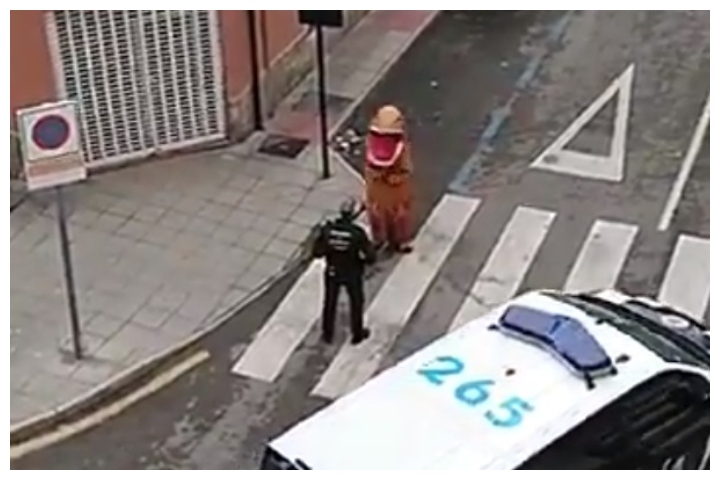You can walk a dog named Rex under Spain’s coronavirus quarantine rules, but you can’t walk yourself in a T. Rex costume.

Video posted by police in Murcia, Spain shows them scolding someone in a dinosaur costume for breaching a country-wide lockdown meant to stem the spread of the virus.
The threat of the COVID-19 disease is deadly serious, but police still had a bit of fun while sharing footage of the Monday encounter. They added the Jurassic Park theme music to the video, which shows an officer talking to the dinosaur while a police vehicle waits nearby.
It’s unclear what the “dinosaur” says, though it might have been something like: “What seems to be the problem, offisaurus?”
The dinosaur eventually slinks away after seemingly being told to go inside.

Get breaking National news
In their post, police reminded citizens that they are allowed to go outside if they’re walking a pet, but not if they’re wearing a tyrannosaurus rex costume.

More than 5 million people have watched the quirky clip on Twitter since it was posted earlier this week.
Spain remains under lockdown as it tries to control the coronavirus outbreak, which has killed more than 1,000 people in the country as of Friday.
Humanity might be hanging under a cloud of virus-generated fear right now, but perhaps there’s a lesson to be learned from the dinosaurs in Jurassic Park.
Life finds a way.
—
- Columbia University student detained by federal agents in residence hall
- Ilhan Omar’s state of the union guest says she needed to go to hospital after arrest
- Liberal MP denounces official who claimed India ceased foreign interference against Canada
- World Economic Forum head steps down amid pressure over Epstein links
Questions about COVID-19? Here are some things you need to know:
Health officials say the risk is low for Canadians but warn this could change quickly. They caution against all international travel. Returning travellers are asked to self-isolate for 14 days in case they develop symptoms and to prevent spreading the virus to others.
Symptoms can include fever, cough and difficulty breathing — very similar to a cold or flu. Some people can develop a more severe illness. People most at risk of this include older adults and people with severe chronic medical conditions like heart, lung or kidney disease. If you develop symptoms, contact public health authorities.
To prevent the virus from spreading, experts recommend frequent handwashing and coughing into your sleeve. And if you get sick, stay at home.
For full COVID-19 coverage from Global News, click here.








Comments
Want to discuss? Please read our Commenting Policy first.